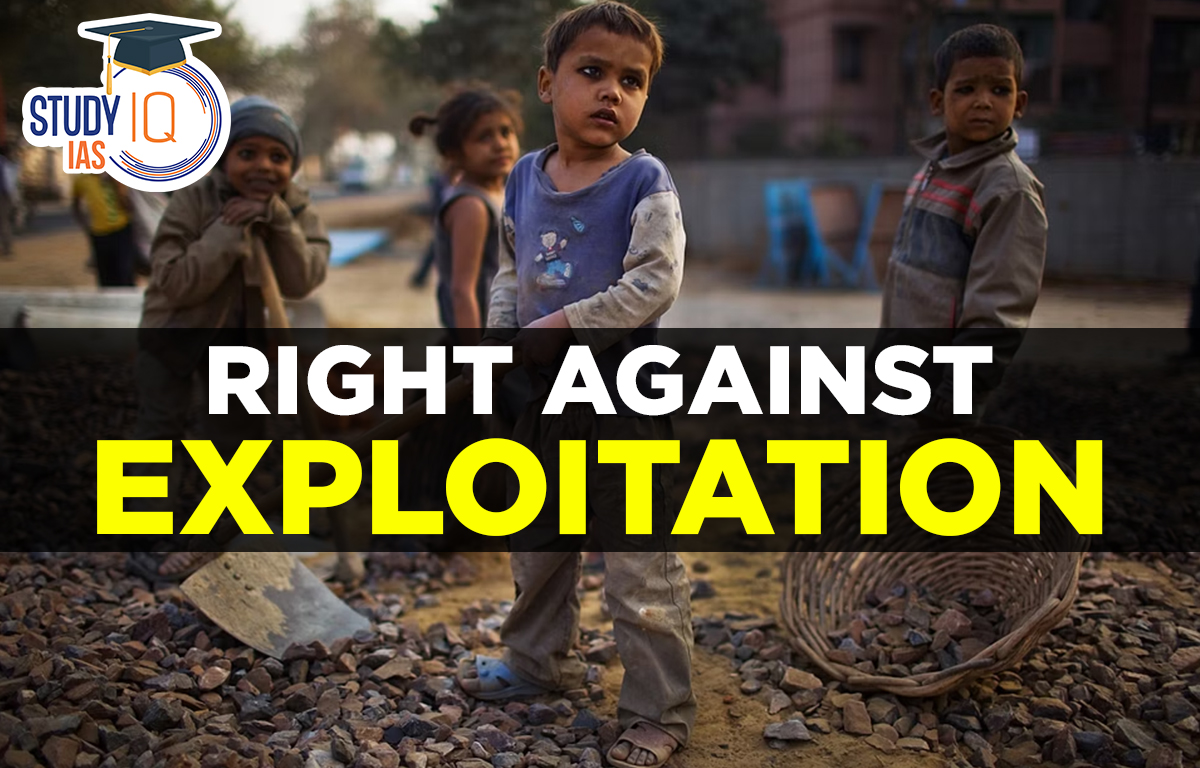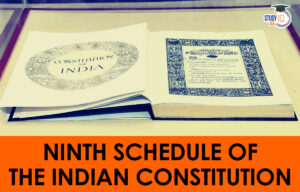Table of Contents
Human exploitation for gain or pleasure is a sad reality in our society and has been present throughout history. It takes many forms, such as slavery, forced labor, sexual slavery, and human trafficking. Human trafficking and forced labor are serious human rights issues. Article 4 of the Universal Declaration of Human Rights prohibits slavery and servitude, yet these practices still occur in many parts of the world, including India. People continue to be exploited for personal or commercial gain through methods like debt bondage, child labor, domestic servitude, and forced prostitution.
In India, Article 23 of the Constitution bans human trafficking and forced labor, making such practices punishable offenses.
Right Against Exploitation
The phrase Right Against Exploitation refers to freedom from all forms of exploitation. The Indian Constitution protects Fundamental Rights against exploitation. Slavery, beggarism, child labour, bonded labour, and other kinds of forced labour are all forbidden under the Indian Constitution as examples of exploitation. Human dignity is guaranteed by Articles 23 and 24, which deal with the right against exploitation.
India is the largest democracy in the world today, but this progress took a lot of hard work. Slavery has been a part of India’s history for a long time. It was finally abolished after the Indian Penal Code was passed in 1860, a process that took many years. The drafters of the Indian Constitution included Articles 23 and 24 to ban such practices. The Constitution guarantees every person their freedom and dignity, leaving no space for exploitation, slavery, or cruel treatment.
| Important Terms | |
| Terms | Details |
| Begar | This is an instance of forced labour, which is defined as unpaid, involuntary work. In other terms, it may be argued that someone is forced to work against his or her will without receiving compensation. |
| Bonded Labour | Bonded labour is prohibited by Article 23 since it is considered a form of forced labour. A person is made to work under this system in order to pay off his debt. They receive relatively little money while getting paid double for the task they accomplish. These debts are frequently carried down to succeeding generations. As a result, it is referred to as a type of forced labour. |
| Human Trafficking | It refers to treating people like commodities for sale and purchase and involves the unethical trafficking of both women and children. Slavery is included in the definition of “trade in human persons,” even if it is not mentioned explicitly in Article 23. The Suppression of Immoral Traffic in Women and Girls Act, 1956, was passed by Parliament in accordance with Article 23 to criminalise human trafficking. |
What do you mean by Exploitation?
Exploitation is a fundamental violation of the Preamble of Indian Constitution as well as the Directive Principle of State Policy outlined in Article 39, which promotes economic equality between persons. Utilizing another person’s services improperly through the use of force is known as exploitation.
Right Against Exploitation Constitutional Provisions
Indian constitution has specific safeguards to prevent the exploitation of weaker groups of society in order to protect against discrimination and foster personal liberty. It has been mentioned under Articles 23 and 24.
Article 23:
In Indian history, antisocial practices like bonded labor, begging, human trafficking, and prostitution were common, and victims faced severe exploitation, often working without fair pay and struggling to meet basic needs. However, Article 23 and Article 24 of the Constitution abolished these practices, clearly prohibiting human trafficking and forced labor. Anyone who breaks these laws can be punished.
Article 23 guarantees a fundamental right that protects individuals from exploitative practices, applying to both citizens and non-citizens. It safeguards against exploitation by the state and private individuals alike. Under Article 35, Parliament can create laws to punish those who violate these rights, placing a duty on the state to eliminate such immoral practices.
Article 24:
Article 24 of the Indian Constitution strictly prohibits employing children under 14 in factories, mines, or any dangerous jobs to protect their health and safety. The state is responsible for ensuring that workers, including children, are not exploited due to economic needs.
Children are the future of the nation, and they deserve good food, education, and health for their development. The Supreme Court case Unni Krishna vs. State of Andhra Pradesh (1993) established that education up to 14 years is a fundamental right, which also includes the right to health and clean water. However, children can work in safe jobs, like in farms or grocery stores.
Objectives of Article 24:
- Protect children from hazardous and exploitative work.
- Work alongside Articles 39(e) and (f) for effective enforcement.
- Allow employment only in safe, non-risky jobs.
Read More: Right to Equality
Article 23 of Indian Constitution
Human trafficking, forced labour, and other practices of similar nature are expressly forbidden by Article 23 of the Indian Constitution. Additionally, it specifies that anyone who violates this article will be prosecuted for their actions and subject to the appropriate legal penalties.
|
Article 23 of Indian Constitution |
|
| Article 23(1) | Prohibition of traffic in human beings and forced labour, Human trafficking, being a beggar, and other similar forms of forced labour are forbidden, and anyone found in violation of this rule faces legal penalties. |
| Article 23(2) | Exception of Article 23
There is nothing in this article that prevents the State from enforcing forced service requirements for public purposes, but when it does so, it is forbidden to discriminate solely on the grounds of race, religion, caste, or class. |
| Article 23 forbids all forms of exploitation and also makes bonded labour as well as human trafficking unconstitutional. | |
| Article 23 States that it ensures citizen protection both against the State and Private Individuals. | |
| Article 35 – Empowers the Parliament to make laws for punishing one who violates Article 23. | |
As per Article 35 of the constitution Parliament has enacted laws in pursuance of Article 23 for the protection of rights against exploitation.
- Bonded Labour System (Abolition) Act, 1976
- Suppression of Immoral Traffic in Women and Girls Act, 1956
Read More: Right to Freedom
Article 24 of Indian Constitution
Children under the age of 14 are not permitted to work in mines, factories, or any other dangerous occupations, according to Article 24 of the Indian Constitution. The purpose of this article is to protect children’s welfare and to guarantee their safety and well-being. According to Article 39 of the Indian Constitution, the State has a responsibility to ensure that workers’ health and physical fitness are not neglected or compelled by economic necessity to engage in risky activities that are inappropriate for their age or physical capability.
Children are a country’s future. Every nation has a responsibility to ensure that its children have a bright future by ensuring their health, nutrition, and education. This will enable them to grow up to be capable citizens who will ultimately advance and develop the country as a whole. As a result, Article 24 is read in conjunction with Art. 39(e) and Art (f).
The employment of minors in benign and non-threatening jobs, such as those in grocery stores or on farms, is not, however, prohibited by this article.
Read More: Article 14 of Indian Constitution
Article 24 of the Indian Constitution Features
- Under this Article, it is against the law to employ minors in dangerous jobs under the age of 14 when viewed in conjunction with Article 39(e) (f).
- It guarantees the well-being and protection of youngsters.
- Article 39, places a responsibility on the State to make sure that kids are not mistreated or made to work in dangerous jobs out of necessity.
- It does not forbid using kids for constructive work.
Read More: Article 15 of Indian Constitution
Child Rights Acts Under Article 24 of Indian Constitution
The Indian Parliament passed a number of laws for the welfare and prosperity of children in order to fulfil the requirements imposed by Article 24 and by other international agreements like the UN Convention on the Rights of the Child.
Factories Act of 1948
The first law enacted after independence to establish a minimum age requirement for child labour in factories was this one. The Act established a 14-year-old minimum age. This Act was changed in 1954 to prohibit hiring children under the age of 17 for nighttime work.
Mines Act of 1952
This Act makes it clear that a mining worker cannot be younger than 18 years old. Consequently, it is forbidden to employ youngsters in mines.
Child Labour (Prohibition and Regulation) Act, 1986
This historic regulation was passed to combat the pervasive problem of child labour in India. It outlined the locations and procedures for both the legal and illegal employment of children. According to this Act, a person who has not reached the age of 14 is considered a kid. The 1986 Act forbids the use of children in 57 procedures and 13 occupations.
Child Labour (Prohibition & Regulation) Amendment Act, 2016
The employment of children under the age of 14 is been prohibited as per this Act. Additionally, it outlaws the use of minors (those between the ages of 14 and 18) in dangerous jobs and processes. With the passage of this amendment act, penalties for breaking this statute become more severe. This Act permits children to work as artists as well as in some household jobs.
Read More: Article 16 of Indian Constitution
Child Labour (Prohibition and Regulation) Amendment Rules, 2017
In order to create a comprehensive and detailed framework for the prevention, prohibition, rescue, and rehabilitation of child and adolescent workers, the government published the aforementioned Rules in 2017. The Rules provide protection for artists by defining the working hours and conditions and clarifying concerns relating to the employment of family businesses.
National Commission for Protection of Child Rights (NCPCR)
In accordance with the Commission for Protection of Child Rights Act, 2005, the National Commission for the Protection of Child Rights (NCPCR) is a commission of the Indian government that was founded in 2007. This statutory body’s goal is to guarantee that all laws, policies, programmes, and administrative procedures adhere to the child rights protections outlined in the Indian Constitution and the UN Convention on the Rights of the Child.
The Center and the State both have this commission in place. Additionally, it aids in the quick resolution of Children’s Court cases involving crimes against children or other rights violations.
Right Against Exploitation UPSC
The stronger has always controlled and taken advantage of the lesser since the dawn of civilisation. In such a situation, it is imperative to safeguard the weaker from such abuse and give them equal opportunity in every field so they can become self-sufficient. Additionally, child labour is a criminal that is pervasive in society and is a curse.
It is a barrier that prevents the nation’s growth and development. The future of a nation is bright when its children are healthy. The future of the children is being ruined, vandalised, and damaged by child labour, which ultimately proves to be a hindrance to the country’s prosperity. Consequently, it is imperative that the laws be applied correctly.
Read More: Article 21 of Indian Constitution


 9th Schedule of Indian Constitution: His...
9th Schedule of Indian Constitution: His...
 Mechanisms to Combat Judicial Corruption...
Mechanisms to Combat Judicial Corruption...
 Registrar General and Census Commissione...
Registrar General and Census Commissione...





















